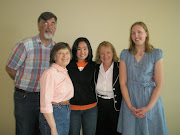It was a fun and relaxed time this last Friday night and Saturday at Waubesa Camp near Madison. Learning about a foreign culture and worldview is always fun for me. I should thank my parents for building a home mixed with both northern and southern Chinese cultures and their models of assimilating into the local Taiwanese culture. Their hospitality has taught me to be open to outsiders and welcome them home.
We had a lot of time interacting with each other while we partook the meals together at the retreat, besides sharing our personal faith journeys with the group near a cozy fireplace. "Daily meals with family, friends, and guests, acts hospitality every one, are the most natural and frequent settings for working out the personal and social implications of salvation," writes Eugene Peterson. "It is virtually impossible to be detached and uninvolved when we are sharing a meal with someone." Peterson suggests that we "take the meal with as much gospel seriousness as we take our Scriptures," that we "take the kitchen to be as essential in the work of salvation as is the sanctuary. Meals are front-line strategies countering the inexorable deconstruction of hospitality that is running amuck in the Western world today."(1) When we talked about our personal salvation stories and shared meals, we were on the right track of getting to know each other on a deeper level.
In a few days in D city, I know we will be teaching conversational English to children and perhaps some adults but not sure how we would extend the hospitality to them in a more tangible and fun way. Maybe crafts, games or even a tea party would be nice things to do. Maybe we can also share our own stories of how we were and are encountering God's love. Stories are powerful; they form the tapestries of our lives. People get to know God through life stories of others.
Robin asked me in our last meal, "How did you use what you have learned in the seminary?" Well, I don't necessary quote Bible verses when I share my personal testimonies, but I always use my personal stories. Another thing is that I focus on people's needs first rather than tell them the gospel via tools like four spiritual laws. For instance, I started an "English Partner" program to connect Americans and international students one-one-one for conversational English one hour per week and monthly "Idioms in the Sermon" class to help internationals understand the sermon better at Blackhawk Church in Fall of 2007. Most of these international students and visiting scholars coming to Blackhawk and International Club are attending Sunday services. They get to hear the gospel truth in the sermons. We just feed them simple lunch, be their friends, and help them with their English. When their needs are met, they bring their friends to come and even advertise these English programs on campus for us.
Word of mouth is very effective among students and immigrants. We do our part and the Holy Spirit does His part. We are doing the cultivating and planting. Someday we might see riping and we might not, but God will.
Teaching conversational English is a great way of cultivating relatships with Turkish and Bulgarian immigrants. I pray that the Lord will lead more students to come this Summer.
(1) Taken from a sermon by PBC's Pastor Scott Grant on Romans 12:3-13 preached on April 22, 2007.
~ Shere-Ling ~





